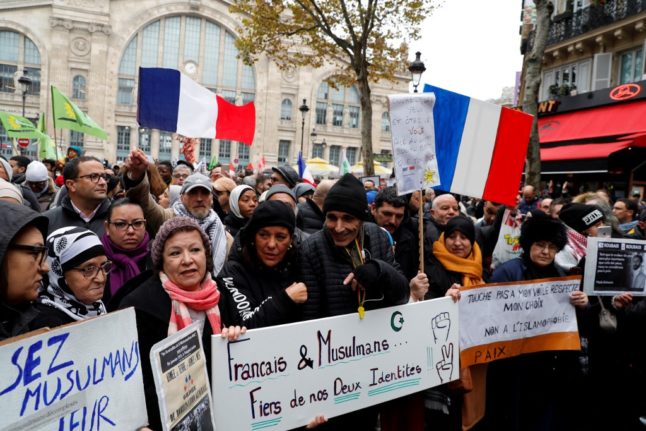What are the rules? Does France have a hijab ban?
No, France does not have a ban on hijabs in public spaces. However, the rules differ when it comes to headscarves and full-face coverings and this can be confusing because both the full-face veil and the Muslim headscarf are often referred to a voile in French.
In 2010, the country brought in a complete ban on clothing that includes full-face coverings – including the burka and niqab. These cannot be worn in any public space in France, at risk of a €150 fine.
The hijab or headscarf, however, is completely legal in public spaces including shops, cafés and the streets and it’s common to see women wearing them, especially in certain areas of the big cities like Paris.
However, that doesn’t mean there is no restriction on women’s freedom to wear the Muslim headscarf.
In line with France’s laws on laïcité (secularism) it is forbidden to wear overt symbols of religion – including the Muslim headscarf – in government buildings, including schools (with the exception of visitors).
Public officials such as teachers, firefighters or police officers are also barred from wearing any overt symbol of their religion while they are at work.
In 2004, President Jacques Chirac’s government banned all religious signs from state schools. While the law also banned crucifixes and kippas, “it was mostly aimed at girls wearing Muslim headscarves,” explained The Local’s columnist, John Lichfield.
This rule covers only schools, and university students are free to wear the hijab.
Burkinis are also subject to certain rules. They are not allowed in public swimming pools in France where there are strict regulations regarding dress (Speedos only for men and compulsory swimming caps), but they are allowed on beaches and in other public spaces.
READ MORE: Burkini: Why is the French interior minister getting involved in women’s swimwear?
This became a source of controversy during the summer of 2022, when Grenoble challenged the ban on the full-body swimsuit by relaxing its rules on the swimwear permitted in public pools.
In response to the challenge, France’s highest administrative court voted to uphold the countrywide ban in June.
What about in athletics?
Some federations, such as the French Football Federation, have banned players from wearing the hijab, along with other “ostentatious” religious symbols such as the Jewish kippa.
A women’s collective known as “les Hijabeuses” launched a legal challenge to the rules in November last year.
Other sports, such as handball and rugby, have a more open position.
Are there plans to change these rules?
Currently, there are no government plans to reverse the ban on full-face coverings including the burka and niqab or to allow the symbols of religion in public buildings, like schools.
There have been attempts to change the current legal framework on the headscarf, however.
In 2021, Senators proposed an amendment to the government’s “anti-separatism bill” that would ban girls under 18 wearing a hijab in public. Several other amendments also targeted Muslim women – such as banning mums from wearing the hijab when accompanying school trips – however these were all defeated in the Assemblée nationale and therefore did not become law.
READ MORE: EXPLAINED: What does laïcité (secularism) really mean in France?
Are the rules followed?
The rules around the niqab are generally followed and it has become quite rare in France.
However sociologist Agnès De Féo, believes that in the years following its ban, the full-face covering became more popular, rather than less.
She wrote that “the law had an incentive effect: it incited women to transgress the ban by embracing the prohibited object. Prohibition made the niqab more desirable and created a craze among some young women to defy the law.”
As of 2020, however, fewer women wore the niqab and burka in France than they did in 2009.
The rules around the wearing the headscarf in public buildings are generally respected, but it’s not uncommon for rules around any form of Muslim dress to be over-zealously interpreted – sometimes by accident, sometimes with a cynical political intent.
One key example was in 2019, when Julien Odoul, a member of Marine Le Pen’s National Rally (RN) party, caused widespread outrage after posting a video of himself confronting a headscarf-wearing woman who accompanied students on a field trip.
He cited “secular principles” – arguing that the headscarf’s ban in schools should also extend into school trips.
In response, the country’s Education Minister at the time, Jean-Michel Blanquer, clarified that that “the law does not prohibit women wearing headscarves to accompany children.”
There was also controversy at election time over candidates who appeared on posters wearing the hijab, although again this is perfectly legal and doe snot contravene secular principles.



 Please whitelist us to continue reading.
Please whitelist us to continue reading.
Member comments